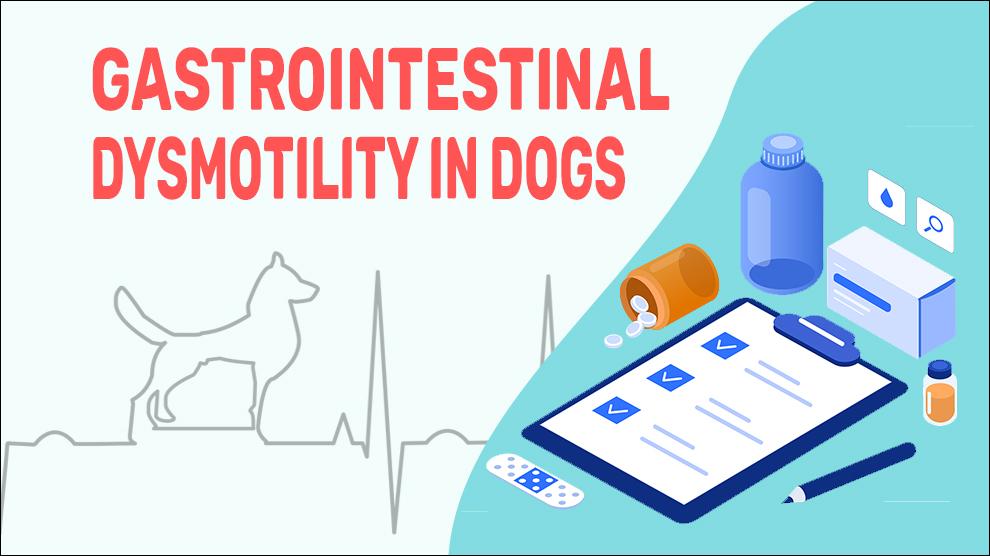What Is Gastrointestinal Dysmotility In Dogs?
Gastrointestinal Dysmotility is a multifactorial disease that includes a spectrum of disorders disturbing enteric neuromuscular coordination characterized by abnormal weakness, or coordination or speed of the muscles of the stomach, esophagus, and the large intestine, and/or small intestine.
In intestinal dysmotility, two factors tend to play a role. They are difficulty with the nerve signals reaching the muscles (neuropathy) and muscle weakness in the intestines (myopathy) or often both factors can be present. Delayed intestinal transit time is the result of severe intestinal dysmotility.
Also known as motility dysfunction and colonic pseudo-obstruction, this condition can also involve chronic inflammation of the dog's gastrointestinal tract distinguished by the presence of inflammatory cells (chronic enteropathies) which cannot be associated with other possible health conditions.
The continuing inflammation damages the intestinal tract and within the intestinal tract, and an allergic-type response occurs. This inflammation impairs the digestion process and absorption of nutrients which in turn lead to other health problems.
Gastrointestinal motility conditions may be either primary (myopathic or neuropathic, that may be sporadic or hereditary) or secondary to drugs and a number of systemic illnesses. Gastrointestinal motility disorders may present with an apparent intestinal pseudo-obstruction syndrome or insignificant symptoms mimicking other “functional” gastrointestinal disorders or remain simply asymptomatic.
Symptoms Of Gastrointestinal Dysmotility In Dogs
- Chronic vomiting
- Chronic diarrhea
- Weight Loss
- Hyporexia to anorexia
- Flatulence
- Abdominal discomfort
- Allergic skin disease symptoms (e.g. red, itchy ears).
- Subcutaneous edema
- Pleural effusion
- Ascites
- Hypoalbuminemia
Treatment Options For Gastrointestinal Dysmotility In Dogs
Dietary Management:
- Switch over to a diet that leads to antigenic modification (eg, protein hydrolysate, novel protein source.
- Exclusion diet: Removal of ingredients that a dog has previously encountered.
- A homemade balanced diet is an alternative to commercial diets.
Antibiotics: Metronidazole, tylosin, or oxytetracycline
Anti-inflammatory and Immunosuppressive Therapy: Prednisolone or prednisone, Cyclosporine, Chlorambucil, Budesonide, or Sulfasalazine.
Home Remedies For Gastrointestinal Dysmotility In Dogs
Vitamin B12 Supplementation: This important vitamin is essential to growth, hematopoiesis, and cell reproduction.
Injection: 50 mcg/kg/2 weeks, Oral: 100 to 200 mcg/kg once daily.
When dietary change gets a good response, that particular diet can be maintained for some time as long as it is balanced.
Prevention Of Gastrointestinal Dysmotility In Dogs
Gastrointestinal Dysmotility due to the hereditary abnormality can be prevented by stopping the breeding of affected dogs so that the risk of passing the condition on to the next generation is averted.
Affected Dog Breeds Of Gastrointestinal Dysmotility
There is no breed disposition.
Basenji, Boxer, French Bulldog, Border Collie, German Shepherd, Irish Setter, Norwegian Lundehund, Rottweiler, Soft Coated Wheaten Terrier, Yorkshire Terrier, Weimaraner
Causes, Diagnosis, And Prognosis For Gastrointestinal Dysmotility In Dogs
- Causes:
The cause of gastrointestinal dysmotility is not yet understood properly. Indeed, it appears to have several causes. Whatever may be the cause, the outcome is the inflammation of the lining of the intestine.
- Genetics
- Abnormal immune response due to bacterial or parasitic infection (Coli, Giardia, or Salmonella).
- Hypersensitivity to a specific food.
- Environmental factors
- The mucosal immune system and immune responses.
- Morbidity:
Though the symptoms of gastrointestinal dysmotility are similar to inflammatory bowel disease (IBD) and irritable bowel syndrome (IBS). Gastrointestinal dysmotility is different from IDB and IBS.
- Mortality:
Death from gastrointestinal dysmotility is uncommon.
- Diagnosis:
- Abdominal radiograph
- Computerized tomography
- Gastrointestinal transit studies
- Barium small bowel series
- Gut biopsies: Include mucosal biopsies of the stomach, duodenum, and/or ileal mucosa (ileostomy).
- Antroduodenal manometry
- Prognosis:
In most cases, gastrointestinal dysmotility is a temporary condition and it is manageable with appropriate treatment. Complete recovery is possible and it is typically able to continue with daily activities.
When To See A Vet For Gastrointestinal Dysmotility In Dogs?
Contact your vet right away, if you notice any of the following:
- Chronic vomiting
- Chronic diarrhea
- Nutritionally compromised dogs that require intravenous feeding.
Food Suggestions For Gastrointestinal Dysmotility In Dogs
The 5 Rules of dietary management:
- Establish a plan for dietary change.
- Plan your menus considering the nutrient requirements.
- Always look for a balanced diet considering energy needs.
- Check with your vet and offer the right food.
- Know your odds; think about what foods you must avoid.
What to feed?
- Try an elimination diet after food sensitivity testing. Many prescribed medications for an autoimmune disease can cause GI and non-GI woes.
- An allergen-free (hypoallergenic) balanced diet (check for thickeners, coatings, flavors).
- Choose a wholesome food, minimally-processed, that is free of preservatives, chemicals, hormones, and other toxic additives.
- Consider a diet with all essential nutrients and also provides plenty of antioxidants (combat free radicals).
- Consider a probiotic supplement with added support for the liver.
Conclusion
With a confirmed diagnosis of Gastrointestinal Dysmotility, the prognosis is generally good and the disease can be comfortably managed.
For many aged dogs, the prognosis is also good with the appropriate medical or dietary intervention. The mortality rate is increased in older dogs with the presence of coexistent diseases.

















